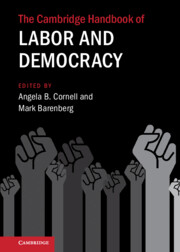Book contents
- The Cambridge Handbook of Labor and Democracy
- The Cambridge Handbook of Labor and Democracy
- Copyright page
- Contents
- Contributors
- Acknowledgments
- Introduction
- Part I Labor and Democracy: Theory and Practice
- Part II History, Politics, and Law
- Part III Labor, Diversity, and Democracy
- Part IV Country and Regional Perspectives
- Part V Labor and Democracy Sectoral Case Studies: Platform Workers, Higher Education, and the Care Industry
- 19 Pursuing Democratic Depth in an Age of Multinational Power and Soft Labor Law
- 20 Corporatization of Higher Education
- 21 The Fissured Welfare State
- Index
- References
21 - The Fissured Welfare State
Care Work, Democracy, and Public-Private Governance
from Part V - Labor and Democracy Sectoral Case Studies: Platform Workers, Higher Education, and the Care Industry
Published online by Cambridge University Press: 25 January 2022
- The Cambridge Handbook of Labor and Democracy
- The Cambridge Handbook of Labor and Democracy
- Copyright page
- Contents
- Contributors
- Acknowledgments
- Introduction
- Part I Labor and Democracy: Theory and Practice
- Part II History, Politics, and Law
- Part III Labor, Diversity, and Democracy
- Part IV Country and Regional Perspectives
- Part V Labor and Democracy Sectoral Case Studies: Platform Workers, Higher Education, and the Care Industry
- 19 Pursuing Democratic Depth in an Age of Multinational Power and Soft Labor Law
- 20 Corporatization of Higher Education
- 21 The Fissured Welfare State
- Index
- References
Summary
This chapter argues that the origins of the worsening exploitation of American labor lie in the social division of labor, in particular the rise of the care economy – the greatest factor in the growth of low-wage work. The care economy was organized politically at a deeper institutional level than labor market changes of the last forty years, on which pro-labor scholars and activists have often focused. Since the post-war years, care work has been governed at a distance, its terms set by the public sector and its administration carried out privately. The growth of care work under such conditions pits workers and clients against each other, but simultaneously creates the possibility of solidarity.
- Type
- Chapter
- Information
- The Cambridge Handbook of Labor and Democracy , pp. 334 - 350Publisher: Cambridge University PressPrint publication year: 2022

